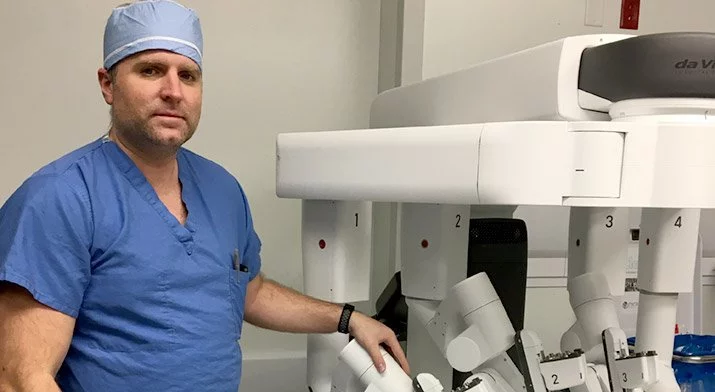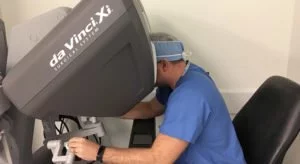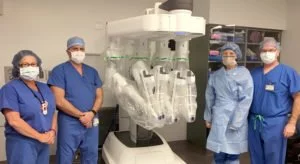Surgical Robot: Important Part of the OR Toolkit
January 3, 2019
Home » Crouse Connects » Surgical Robot: Important Part of the OR Toolkit

While I watched a recent NBC news segment entitled “The da Vinci surgical robot: A medical breakthrough with risks for patients” with great interest, it reminded me of my days during college and medical school when I was learning the trade of painting and wall coverings.
My mentor, Alex, was careful to show me all the tricks, tips and tools needed to not only get jobs done quickly and efficiently, but to ensure that they were of high quality and completed with a level of professionalism that was beyond our customer’s expectations.
A Good Craftsman Never Blames His Tools
As I moved through my training with Alex, he taught me increasingly complex tasks — using an airless sprayer, hanging commercial vinyl, refurbishing properties with fire and/or water damage. One day, however, I found it difficult to work with an oil-based paint we were using on some metal doors and frames. Although this material looks fantastic when applied the right way, it can look terrible when applied poorly — and that day, I was doing a good job of the latter.

Dr. Sadowitz at the controls of one of the tools of his trade, the da Vinci robot.
When Alex came over to inspect my work, I made sure to let him know my objections to both the material and the brush I was using, and how both seemed to be inadequate for the job I was trying to accomplish. Alex stopped for a moment and then said matter-of-factly, “Benjamin, a good craftsman never blames his tools.” To my chagrin, he then proceeded to show me, with the same tools and materials, how to do the job the right way and make it look the way it should.
Robotic Surgery: Improved Patient Care and Outcomes
I believe the same can be said about the surgical robot and other medical devices we use in the operating room today. Technology has dramatically changed what we do in the OR, and the robot is a prime example. I would argue that the bulk of these technological advances have dramatically improved patient care and outcomes when used in the appropriate manner. Furthermore, to equate the robot with increased risk for patients is equivalent to my trying to blame the materials and tools I was using on the poor painting results I’d achieved that day.
The “tool” was not the problem then — and I don’t believe it is the problem now. On the contrary, I believe the da Vinci robot we use at Crouse Health is a tool that offers significant advantages to both my patients and myself when used the right way. Indeed, some of these patient benefits were mentioned in the NBC segment, and they include less blood loss during the procedure, smaller incisions, and quicker recovery time with a rapid return to normal, everyday activity.

Dr. Sadowitz (second from left) and members of Crouse’s Witting Surgical Center OR team.
Talk with Your Surgeon
Most importantly, it is vital to understand that no matter what “tool” or approach is used to undertake a surgery, the risks of the operation do not change and are not eliminated. As uncomfortable as it may be, risk should always be discussed with patients — both the risks associated with a surgical procedure and the risks associated with the conservative management of a potential surgical issue. If you have a planned operation in the near future and have not had this discussion with your surgeon, make an appointment to review your individual condition. There is not a more imperative conversation you can have before your operation.
Benjamin Sadowitz, MD is a Syracuse native and partner in CNY Surgical Physicians and a member of Crouse Health’s Institute for Robotic Surgery. Crouse’s multi-specialty robotics program is the largest in the region, with more than 1,200 procedures performed in 2018. Dr. Sadowitz earned his medical degree from SUNY Upstate Medical University, where he also completed his general surgery internship and residency. He subsequently completed a robotics/advanced laparoscopic fellowship in advanced gastrointestinal and hepatopancreaticobiliary surgery at Florida Hospital Tampa. Dr. Sadowitz is board certified in general surgery and is a fellow of the American College of Surgeons. To schedule an appointment with Dr. Sadowitz, call 315-470-7364.
Categories: Crouse Physicians
Tags: Benjamin Sadowitz, CNY Surgical Physicians, Crouse Health, da Vinci robot, robotic surgery, surgery
Share this
